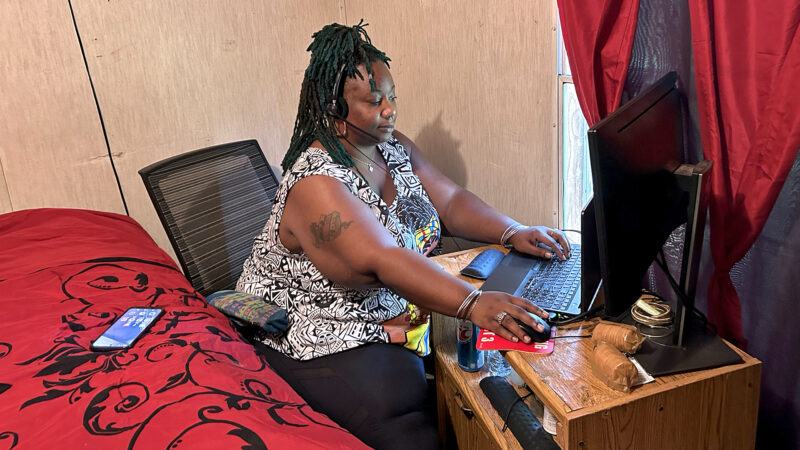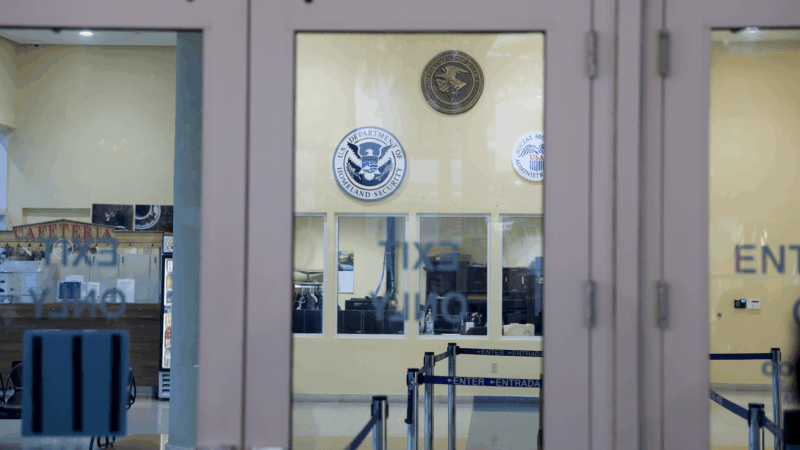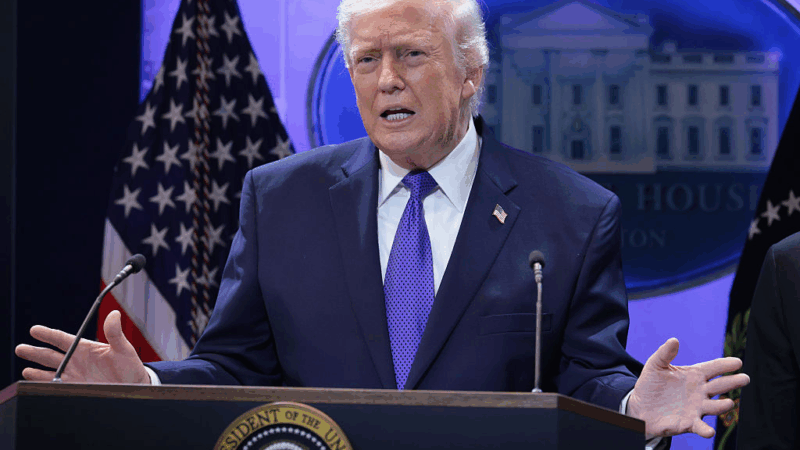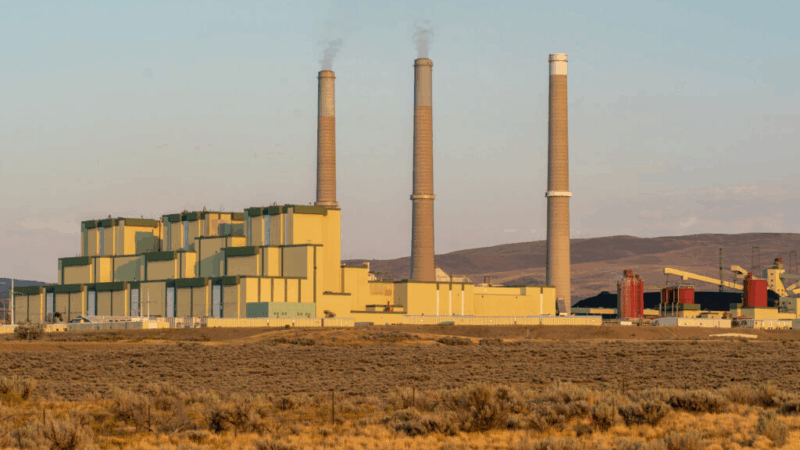‘Stupidity of politics’: Medicaid expansion effort dies in Mississippi
Lakeisha Preston logs into her work computer in her home on April 26, 2024, in New Hebron, Mississippi. Preston helps people enroll in Medicaid but cannot do so herself because she falls into the coverage gap in Mississippi. (Gulf States Newsroom)
In the bedroom-slash-office of her mobile home in New Hebron, Mississippi, Lakeisha Preston logs into work on her desktop computer. She doesn’t have to wait long for a call to come in — and they all start the same.
“Thank you for calling the marketplace. My name is Lakeisha, how can I assist you today?” she says, affecting the bright and cheery voice anyone who’s ever worked in customer service would instantly recognize. “Oh, you’re needing help about Medicaid coverage? I can help you with that. Can I have your first and last name?”
Preston works at a federal Medicaid call center. Every day, she helps people enroll in Medicaid in other states that have adopted Medicaid expansion — a provision in the Affordable Care Act passed more than a decade ago that expands coverage for more low-income Americans.
But even though her job is to assist people with incomes similar to — or sometimes more than — hers get Medicaid coverage, she doesn’t qualify because Mississippi is one of 10 states that has refused to adopt Medicaid expansion. Preston falls into what’s known as the coverage gap — she makes too much for Medicaid coverage but too little to afford private insurance premiums.
Preston said she loves to help people, but knowing she would qualify for Medicaid in another state is tough medicine to swallow each workday.
“It sucks,” she says. “It really sucks to know that a person in a different state, in a higher living wage situation, can get Medicaid, and I work full time and can’t get it.”
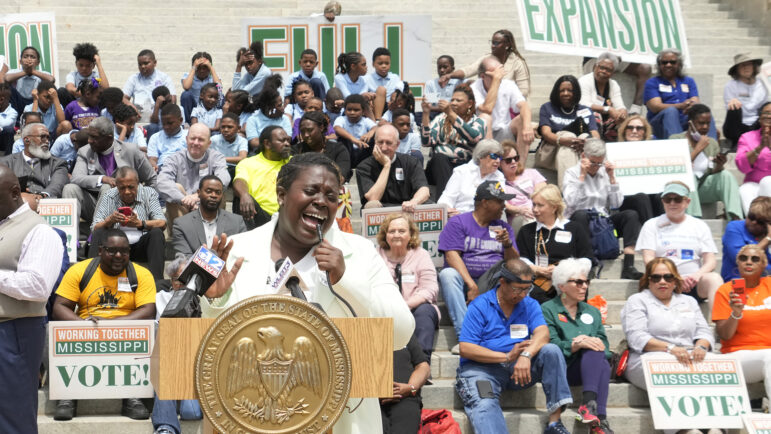
A recent report from the Commonwealth Fund, a health care research group, showed the state’s health system performance is the worst in the country, especially for Black people. It also found that increasing health coverage is the best way to improve people’s health.
This year, for the first time, Mississippi lawmakers took a serious look at expanding Medicaid. The Republican-led state saw separate proposals from both the House of Representatives and the State Senate, which could have extended coverage to 200,000 more low-income residents — including the 74,000 people in the coverage gap.
Legislators, however, couldn’t come together on a compromise bill. The main point of contention revolved around a work requirement. Republicans in the State Senate were adamant that anyone who wants health benefits has to work a minimum number of hours to qualify. But the federal government would have to approve an expansion plan with a work requirement, something the Biden administration hasn’t done. That disagreement killed the proposal.
Many in the coverage gap, like Preston, do work — they just can’t afford insurance. Preston is also a single mom, and her son, who has ADHD, is on Medicaid, so his medicine is covered. But hers isn’t. She has high blood pressure and high cholesterol — medication she says she has to take every day or she’ll die. Her job at the call center offers health insurance, but it comes with a $2,500 deductible.
“I might as well not have it,” Preston says. “Or I might as well just pay out of pocket for something else.”
Come for the savings, stay for the salvation
Preston said that cost often keeps her from going to the doctor and that can lead to a whole host of other problems.
“I can’t tell you the number of patients who I see who come in with advanced disease who have full-time jobs,” said Dr. Roderick Givens, a radiation oncologist and board chair of the Mississippi State Medical Association. “Plain and simple — that’s the coverage gap. The reason they’re coming in with advanced disease is they haven’t seen a physician in years. They can’t afford it. They don’t have coverage.”
Givens and the state’s medical association fully support Medicaid expansion. He said it’s long overdue, especially since the federal government would pay for the vast majority of it — and most Mississippians support it.
“Why does that not translate when it comes to policy and a third party really willing to fund 90-to-100% of that cost? It’s just completely insane,” Givens said before supplying his own answer: “It’s called the stupidity of politics, period.”
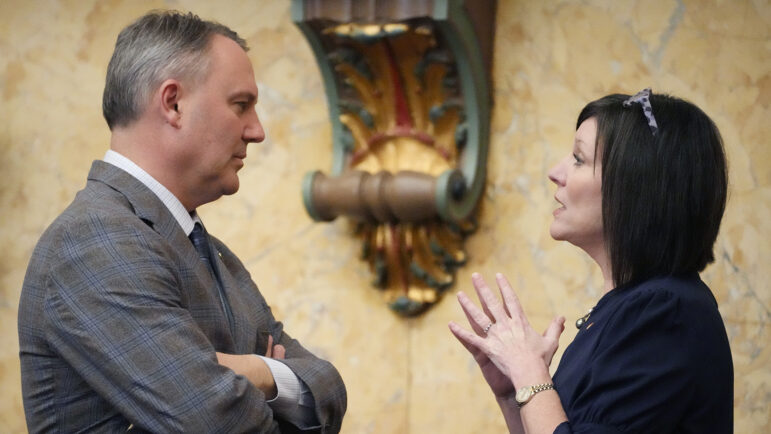
Mississippi’s Republican House Speaker Jason White also believes politics have gotten in the way of expansion in the past.
“It’s President Obama’s signature piece of legislation. No denying it. It’s known as Obamacare,” White said. “So there are a lot of political dynamics centered around it that probably never allowed it to get off the ground.”
The life cycle of Medicaid expansion in the Gulf South does seem to be dependent on politics. In Alabama this year, expansion language was included in an early draft of a casino and gambling bill and was widely supported by Democratic lawmakers. But it was later removed and didn’t receive any more discussion in the Republican-led legislature.
Louisiana adopted expansion in 2016 under Democratic Governor John Bel Edwards. But the newly-elected Republican Governor Jeff Landry has proposed retroactively implementing a work requirement for people covered by Medicaid — though he hasn’t introduced the idea of repealing expansion.
White said once expansion is on the books and states see the benefits, legislators don’t go backward and undo it. And, he said, Mississippi’s business community supports expansion, which was a key factor behind this year’s serious discussion.
“I kidded some of my fellow Republicans, I said, ‘Look, come for the savings, if you will, and then you can stay for the salvation and the good things that it does to improve people’s lives,’” White said. “If you can’t get there because it’s the right or compassionate thing to do to help these individuals, get there because it makes sense from a business standpoint.”
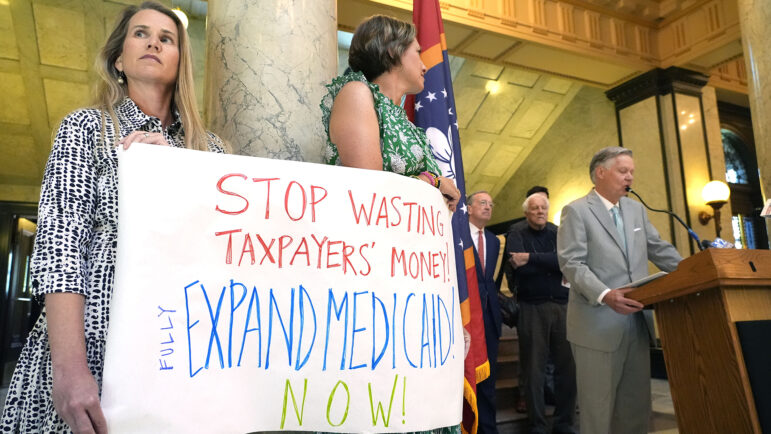
Death of Medicaid expansion
For a moment, it seemed lawmakers had managed to find a compromise proposal that covered individuals up to 138% of the federal poverty level — just over $20,000 for an individual — and had a work requirement of 100 hours per month, or around 25 hours per week.
But even if it was passed, it still faced additional hurdles. If it didn’t get federal approval for the work requirement, expansion would not go into effect. In a last-ditch attempt, White offered a new proposal — a referendum that would put two questions on the ballot for Mississippi residents to vote on in November: Should Mississippi expand Medicaid? If so, should the expansion include a work requirement?
Mississippi Governor Tate Reeves also weighed in on X.
“Today, the Mississippi House and Senate will vote on FULL Obamacare Medicaid Expansion. Up to 138%. Just like Obama-Biden wanted!” Reeves posted.
He urged Republicans in the state legislature to vote against the plan.
Whether or not Reeves would have vetoed legislation is a mystery for another day — which may come in next year’s legislative session. Republican Lt. Gov. Delbert Hosemann said White’s proposal to put the question to the voters “was not well received” by Senate leaders, and that passing Medicaid expansion would be the first order of business during the 2025 legislative session.
White described himself as an optimist, and he said despite the outcome of this year’s legislative session, this isn’t the end of efforts to expand Medicaid in Mississippi.
“I think the drumbeat just continues to grow and get louder now that our business community is on board,” he said. “I think you’re only going to see more and more and more Mississippians say, ‘Why aren’t y’all being smart? Why don’t y’all do this? This is the right thing to do.’”
This story was produced by the Gulf States Newsroom, a collaboration between Mississippi Public Broadcasting, WBHM in Alabama, WWNO and WRKF in Louisiana and NPR. Support for health equity coverage comes from The Commonwealth Fund.
In the shadow of the Olympics, migrants search for a welcome in Milan
As Italy cracks down on migration, Milan takes a different path — offering shelter and integration to asylum seekers even as the central government tightens borders and funds deterrence abroad.
Trump to raise global tariffs. And, most say the state of the union is weak, poll says
President Trump says he is raising global tariffs to 15%. And ahead of the president's address tomorrow, most Americans say the state of the union is not strong, according to an NPR poll.
U.S. has a quarter fewer immigration judges than it did a year ago. Here’s why
The continued drain of personnel from the already strained immigration court system has contributed to depleted staff morale, mounting case backlogs — and floundering due process.
Poll: Most say the state of the union is not strong and the U.S. is worse off
Ahead of the State of the Union address on Tuesday, evidence continues to mount that President Trump is facing political headwinds.
The owners want to close this Colorado coal plant. The Trump administration says no
The Trump administration has ordered several coal plants to keep operating past their planned retirement, part of a larger effort to boost the coal industry. Two Colorado utilities are pushing back.
Influencers are promoting peptides for better health. What’s the science say?
The latest wellness craze involves injecting these molecules for athletic performance, longevity and more. Scientists say the research isn't keeping pace with the health claims.

